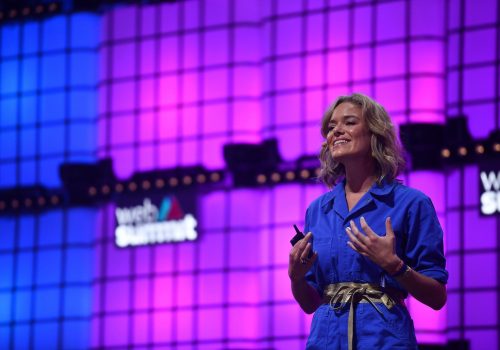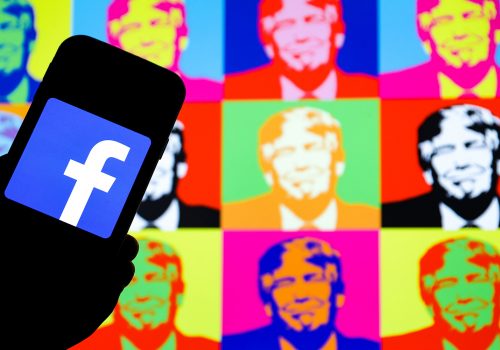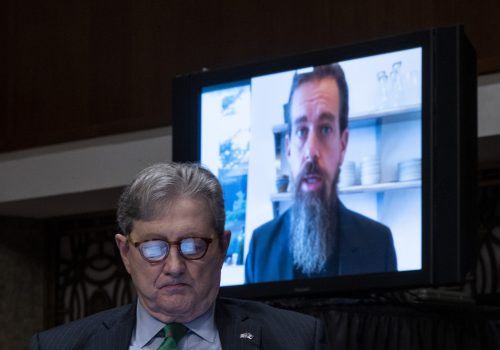Former Wikipedia chief on fighting censorship and potentially paying contributors to address diversity gaps
When the Turkish government asked Wikipedia to take down references to reports that Turkey was supporting militants in Syria, the online encyclopedia refused—and had its reach to more than eighty million Turkish residents cut off. While that would have been a major hit for many online media platforms, Wikipedia was uniquely positioned to weather the storm, battling in court for nearly three years until Turkey’s highest court ruled in January 2020 that the government’s ban violated free-expression rights.
Wikipedia’s success was thanks to a series of intentional organizational decisions, said Katherine Maher, who stepped down in April from her post as the Wikimedia Foundation’s CEO and executive director and who is now a nonresident senior fellow with the Atlantic Council’s newly established Democracy & Tech Initiative. At a time when major digital platforms from Facebook and Twitter to TikTok are facing censorship around the world—particularly in countries like India, Russia, and China—Maher believes for-profit media companies can learn from Wikipedia’s example.
“It is expensive, it is hard, it takes multiple years to set up. But… I know that those costs are not significantly greater than what is already being expended by these companies to manage their reputations and to manage the sort of regulatory environment,” Maher said.
Maher appeared Tuesday at the 360/Open Summit, hosted by the Atlantic Council’s Digital Forensic Research Lab. In conversation with NBC News senior reporter Brandy Zadrozny, Maher also spoke about how Wikipedia and other platforms can fight disinformation, increase diversity, and foster trust. As Atlantic Council CEO Frederick Kempe put it when introducing the discussion, Wikipedia’s “unique model of volunteer editors, multiple language and other affiliate communities, and nonprofit status makes the platform a microcosm of the world.”
Below are some of the key takeaways from the discussion.
Read the full transcript
Staring down censorship
- In taking on Turkey, many for-profit companies would have struggled to stomach the loss of an eighty million-person market. But Wikipedia had set itself up to be “very censorship-resilient,” as Maher put it. Its nonprofit status and reliance on donations rather than advertising allowed it to focus on its core mission rather than revenue goals. “We didn’t have a market incentive, so we are able to make decisions that really are about the long term,” Maher said.
- Wikipedia built its platform so that content couldn’t be taken down for specific audiences—either it stayed up universally or not at all. That allows Wikipedia to resist requests from governments to selectively censor articles for their citizens. Wikipedia also does not keep precise data tracking its users, making it impossible for governments to seize user information and then punish those users.
- Wikipedia is selective in where it places its staffers and servers as well, knowing such assets could be used as “brokers and pawns,” as Maher put it. “We knew that if we ever took content down and bowed to political pressure, it would just be that slippery slope argument around the world, and how could you ever trust what you saw on Wikipedia ever again?” Maher said.
An imperative for diversity
- Because Wikipedia relies on volunteers, its contributors typically are wealthy enough to have ample leisure time—and about 85 percent are male. With significant coverage gaps for women, minorities, and the global south, Maher said Wikipedia could consider paying contributors to help solve its diversity problem: “It may be time to really think about… What does a model of compensation look like, in order for us to be able to redress some of the exclusion that we’ve seen over time?”
- According to Maher, Wikipedia considers diversity vital to its quest for knowledge. “The more representative our knowledge is, the better our data is, the more that it is truly encompassing and reflective of all those experiences, the better my understanding of the world is going to be,” she said, “the better I’m going to feel like I participate in that body of knowledge, the more agency that I’m going to have as an informed citizen.”
How digital media can build trust
- Many governments and social media companies must balance fostering free speech with combating mis- and disinformation. One way to guide better behavior is to think of “the right to know as being just as important as the right to expression,” Maher said. Many government-guaranteed rights were constructed with local communities and particular nations in mind: “We’ve never really thought about rights at the scale of a network of three billion people, and what our norms and expectations are, and whether traditional structures of governance can really meet this moment.”
- Maher credits Wikipedia’s broad public trust to realizing, upon its founding in 2001, that it was starting from a place of having to earn trust—while more established institutions may have started the internet age believing that their prestige and histories had already merited respect from the public. “We have the humility to admit we’re a work in progress,” Maher said.
Nick Fouriezos is an Atlanta-based writer with bylines from every US state and six continents. Follow him on Twitter @nick4iezos.
Watch the full event
Further reading
Image: Courtesy: Katherine Maher


